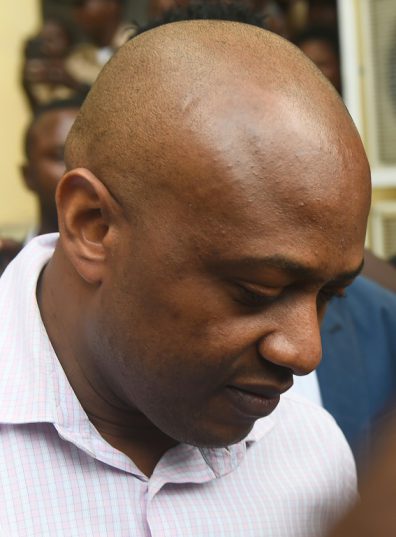Porsche 911 GT3 sets new Nürburgring record for manual cars
A lawyer for Chukwudubem Onwuamadike, who will face trial on October 19, said in a statement that “police told him to plead guilty, failure to which the police will kill him”.
The charge sheet, seen by AFP, accuses a heavily armed gang of five men and one woman of kidnapping Dunu Donatus in February, holding him for 57 days and receiving a 223,000 euros ($266,000) ransom.
Officers jostled to take selfies with the defendants in chaotic scenes before Wednesday’s hearing began.
Evans, 36, was arrested in a major police sting in June and has since been held in detention along with his alleged accomplices.
Judge Hakeem Oshodi ordered that he be remanded in custody until the start of the autumn trial.
The group appeared in the High Court in Lagos looking solemn and cramped in the small dark wood panelled dock where they were flanked by members of the security forces.
Evans’ defence team allege that he has been denied access to his lawyer and family and that they were only made aware of Wednesday’s hearing through social media.
“We intend to challenge this unconstitutional procedure for hoodwinking, undue influence, brainwashing and coercion,” said the statement by defence lawyer Olukoya Ogungbeje.
Police staged a media visit to Evans’ home shortly after his arrest in which he explained his methods, highlighting the life of luxury he enjoyed in Nigeria’s commercial capital.
– ‘Anybody that is rich’ –

Evans denied having personally murdered during kidnap operations
In another interview with local broadcaster Channels TV in June, Evans revealed the meticulous planning that went into kidnap operations and how targets were selected.
“Anybody that is rich, you will know that he is rich. I have people that give me information,” said Evans, who is a well-known figure in the Lagos criminal underworld according to local media.
“We would carry the man, put them inside the motor and go.
“The highest money we have collected is from somebody living in Festac (Lagos) — $1 million.”
Evans denied having personally murdered during kidnap operations.
“It is not me that killed. I don’t kill,” he said, adding he was unsure if his accomplices had.
Evans was himself the victim of a kidnapping in 2015 but was freed following the intervention of a gang leader, according to the Saturday Tribune newspaper.
Dozens of heavily armed officers surrounded Evans as he was transferred from the courtroom back to prison on Wednesday.
Kidnapping for ransom used to be confined to Nigeria’s oil-rich south, where criminal gangs would typically target expatriate workers.
But the practice has spread across the country as the economy has faltered, with Control Risks consultancy warning that the phenomenon has become “entrenched” nationwide.
Nnamdi Obasi, senior Nigeria researcher at the International Crisis Group, said poverty had made “anybody” a target and had led to a rise in “spontaneous” kidnappings.
Most victims are usually released unhurt after ransom money is paid but the country still had the fourth highest kidnap rate in the world in 2016, according to Control Risks analysis.
Ten of Nigeria’s 36 states carry the death penalty for kidnapping, with Lagos state only enforcing capital punishment in cases where kidnap targets are killed.
Download our app